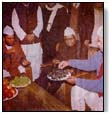
Muslim clergy set to issue fatwa against iftar parties
George Iype in New Delhi
 On Friday, after his sermon to pious Muslims in Old Delhi's Jama Masjid, Shahi
Imam Abdullah Bukhari sat down with a dozen odd Imams to discuss, the "
anti-Islamic tamasha" -- the umpteen iftar parties being hosted by
India's politicians.
On Friday, after his sermon to pious Muslims in Old Delhi's Jama Masjid, Shahi
Imam Abdullah Bukhari sat down with a dozen odd Imams to discuss, the "
anti-Islamic tamasha" -- the umpteen iftar parties being hosted by
India's politicians.
Bukhari and his son Naib Imam Ahmed Bukhari, who believe they are India's most important Muslim religious leaders, have attended the sumptuous iftar dinners thrown up by politicians
of all hues in the holy month of Ramzan.
But no more do they feel that 'the spirit of Islam' is being celebrated in these
parties. "The Ramzan parties hosted by politicians have become a political tamasha. And
it hurts our religious sentiments," says Ahmed Bukhari.
"I attended the iftar dinner hosted by Prime Minister H D Deve Gowda. But there was
nothing there that celebrated the Muslim holy month. The crucial issue there was whether
Congress president Sitaram Kesri would turn up for the dinner or not," the Naib Imam
told Rediff On The NeT.
"We do not want our most important religious days to be carnivals for political
wheeling-dealing," he added.
Thus the angry imams of Delhi have suggested two ways to ban "these denigrating dinner
parties to Muslim sentiments." First, convene a meeting of top Muslim clergymen to
finalise an action plan, possibly to issue a fatwa to direct all Muslim politicians to
stop giving iftar parties.
Secondly, petition the Supreme Court to ban all iftar parties hosted by political
leaders.
Interestingly, the momentum against political iftar parties has already begun. Maulana
Ikramul Haque, the Pesh Imam of Patna's Jama Masjid on Friday, issued a fatwa to all
Muslim leaders, who attended Bihar Chief Minister Laloo Prasad Yadav's iftar party.
Terming Yadav's iftar party "anti-Islamic," Haque's fatwa directed the Muslim men who ate from the Janata Dal president's bounty to observe one day's roza (fast) after Eid as
punishment.
In fact, it was the Bihar chief minister who set this year's tone for iftar exercises.
In characteristic style, Yadav sent gilt-edged invitations to more than 2,000
guests, most of them being politicians, bureaucrats and journalists.
Since then, in the last three weeks, Delhi witnessed some 25 glamorous iftar parties.
Some of the much-talked about parties included those hosted by President Shankar
Dayal Sharma, Vice-President K R Narayanan, Prime Minister Deve Gowda, his
ministerial colleagues and top Congress and Janata Dal leaders.
Relations between the United Front government and its indispensable ally, the Congress,
slipped into an all-time low when the prime minister did not attend the Congress
president's iftar party and an infuriated Kesri reciprocated with a matching
absence at the premier's party.
At some iftars, the centre of attraction is Sonia Gandhi, whose
smiles and gestures towards Kesri and his predecessor P V Narasimha Rao are grist to the
political gossip mill. "Many new stories have been written about the subtle
political signs that Sonia's gestures indicate at iftar parties," says a senior
journalist.
Political reporters acknowledge the late Hemvati Nandan Bahuguna as the political creator of
iftar parties. "Bahuguna started the concept when he
was chief minister of Uttar Pradesh. He used to call a score of prominent Muslims to
his home for a quiet sunset dinner," recollects a seasoned journalist.
Bahuguna is said to have brought the iftar party to Delhi when he became a
minister in Indira Gandhi's Cabinet and this inspired her to hold huge
iftar parties.
Bahuguna's son, Shekhar Bahuguna, who is at present a general secretary in the UP state
Congress, says his father's iftar parties were never public relations exercises to
lure Muslim support. "Most of those who attended his iftars were Muslim clergymen,"
Shekhar Bahuguna told Rediff On The NeT.
Many believe it was Indira Gandhi who gave a political colour to iftar parties.
"Anxious to woo Muslims, Mrs Gandhi's iftars in the 1980s were virtual political fetes,"
admits a Congress leader.
"At today's iftar shows, politicians are more relevant than Muslims and an invitation to
the breaking of the Ramzan fast is a valued trophy among politicians and bureaucrats,"
he adds.
But with the Muslim clergy determined to prevent their Ramzan feast becoming political
gimmicks, it remains to be seen if smiles, gestures and other body language will
become the menu for next year's iftar parties among the capital's political leaders.
|









